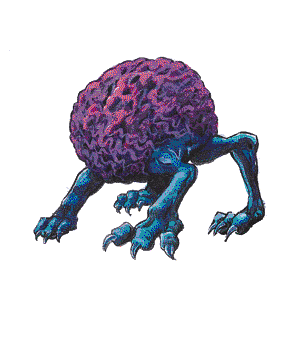

2140

| Adult | Larva | |
|---|---|---|
| Climate/Terrain: | Any subterranean or dark areas | Dark, moist areas |
| Frequency: | Very rare | Rare |
| Organization: | Solitary | Solitary |
| Activity Cycle: | Any | During darkness |
| Diet: | Mental energy | Emotions |
| Intelligence: | Very (11-12) | Not ratable |
| Treasure: | D | Q�1d20 |
| Alignment: | Chaotic evil | Neutral (evil) |
| No. Appearing: | 1-2 | 1-3 |
| Armor Class: | 4 | 5 |
| Movement: | 15 | 9 |
| Hit Dice: | 6+6 | 3+3 |
| THAC0: | 13 | 17 |
| No. of Attacks: | 4 | 1 |
| Damage/Attack: | 1-4/1-4/1-4/1-4 | 2-5 (1d4+1) |
| Special Attacks: | Psionics, stalking | Psionics, poison |
| Special Defenses: | +3 weapon needed to hit; see below | Psionics |
| Magic Resistance: | Nil (see below) | Nil |
| Size: | T (6� long) | T (6� long) |
| Morale: | Fanatic (17-18) | Unsteady (5-7) |
| XP Value: | 6,000 | 650 |
Psionics Summary (Larva)
| Level | Dis/Sci/Dev | Attack/Defense | Score | PSPs |
|---|---|---|---|---|
| 2 | 2/1/5 | II/M- | 10 | 150 |
Psychometabolism � Science: ectoplasmatic form; Devotion: body equilibrium.
Telepathy � Sciences: nil; Devotions: aversion, contact, id insinuation, telepathic projection.
Psionics Summary (Adult)
| Level | Dis/Sci/Dev | Attack/Defense | Score | PSPs |
|---|---|---|---|---|
| 6 | 3/3/11 | EW,II/M-,TS,IF | =Int | 200 |
Psychometabolism � Science: ectoplasmatic form; Devotions: body equilibrium, chameleon power, expansion, reduction.
Psychoportation � Sciences: nil; Devotion: astral projection.
Telepathy � Sciences: domination, mind link; Devotions: aversion, contact, ego whip, ESP, id insinuation, telepathic projection.
The term �intellect devourer� refers only to this creature�s adult form; its larva is an ustilagor. Both resemble a brain on four legs. The body of the intellect devourer has a crusty protective covering, and its legs are bestial, jointed, and clawed. The ustilagor�s body is soft and moist and usually covered with a gray fungus; it has a 3-foot-long tendril at the front, and its legs are spindly and coral-like. Though both forms are about brain-sized, the adult can use psionics to alter its size.
Combat: The ustilagor attacks by striking with its flexible tendril. The tendril secretes an alkaline substance which causes 1d4+1 damage on a successful hit, as well as another 1d4+1 damage the following round, unless the victim makes a successful saving throw vs. poison. The creature is quite agile, and can jump and dart quickly.
The ustilagor can also attack psionically, first making contact with a victim�s mind. It uses aversion to give a victim an aversion to fungus or to a certain area; id insinuation to effectively paralyze the victim; or telempathic projection to increase an opponent�s dislike or distrust of companions.
Despite its psionic prowess, the ustilagor cannot be attacked mentally (magically or psionically) except by psionic blast. Its fungal growth interferes with and prevents mental attacks, protects the ustilagor from drying out, prevents cerebral parasites from attacking, and makes the creature immune to fungal attacks and any power that reads or affects an aura.
The adult form also prefers to attack with psionics, though its three-taloned paws can all be used in the same round, as the creature jumps on an opponent and rakes.
Aside from its regular psionic powers (see below), the adult intellect devourer has specialized forms of three psionic powers; these are constantly in effect and cost no PSPs, but they do count as psionic activity for detection purposes. Through a special form of energy containment, the intellect devourer is immune to damage from normal and magical fires, and takes only one hit point per die of electrical damage; a form of split personality is always in effect, allowing the creature to attack with psionics and claws in the same round; and it has psionic sense with a 60 foot range.
The intellect devourer is immune to weapons with less than a +3 enchantment, and takes only 1 point of damage per hit from those weapons which can harm them. A death spell has only a 25% chance of success, but power word: kill is effective. A protection from evil keeps the intellect devourer at bay, and bright light (including that caused by fire) drives it away.
An intellect devourer hunts and stalks psionic creatures. After killing a psionic victim, it sometimes uses reduction to enter the body, devour the brain, and occupy its place. It reads the victim�s mind as it devours it, then animates the body from within, using it to find other minds to attack and devour.
Habitat/Society: Intellect devourers dwell beneath the ground or in dismal wilderness areas. Their reproductive method is unknown. The intellect devourer rarely protects its young, and may even devour them. Ustilagor develop a symbiotic relationship with a bizarre fungus which feeds on residual thought emanations from the ustilagor�s victims. An ustilagor becomes an adult by consuming the brain of a psionic creature.
Ecology: Mind flayers raise intellect devourers, treating the ustilagor as culinary delights, and using adults as watch dogs. Both forms of the creature can be used as components in items and potions related to ESP and mind control.
Last Modified: September 02, 2009, 13:12:28 GMT

◆ 1052 ◆